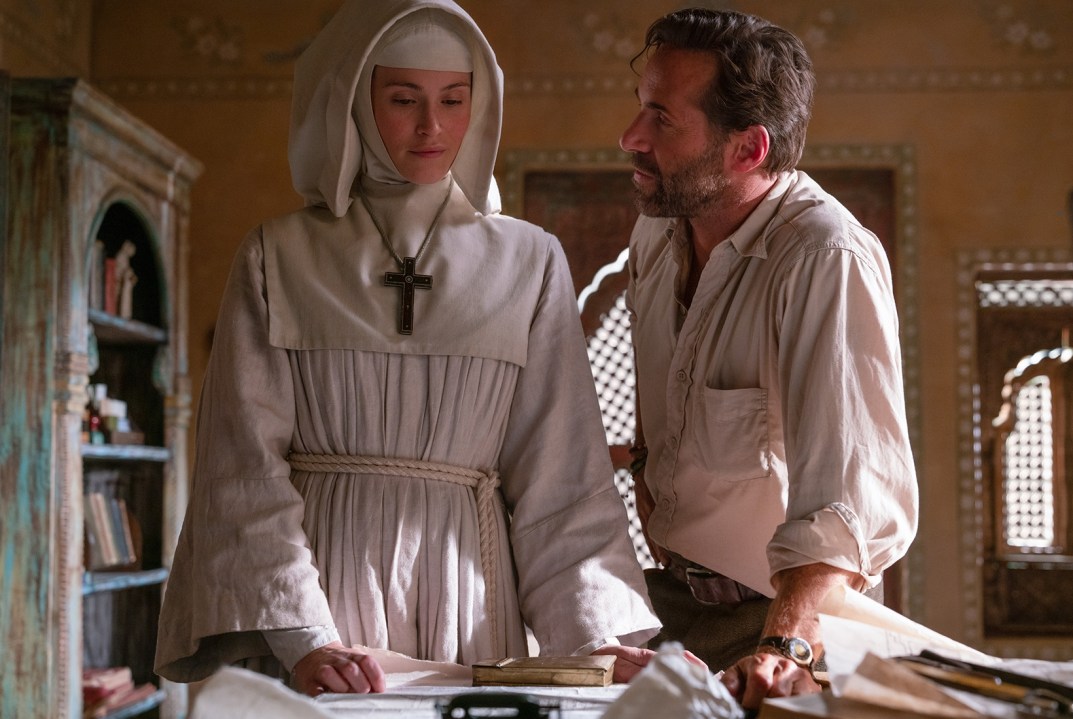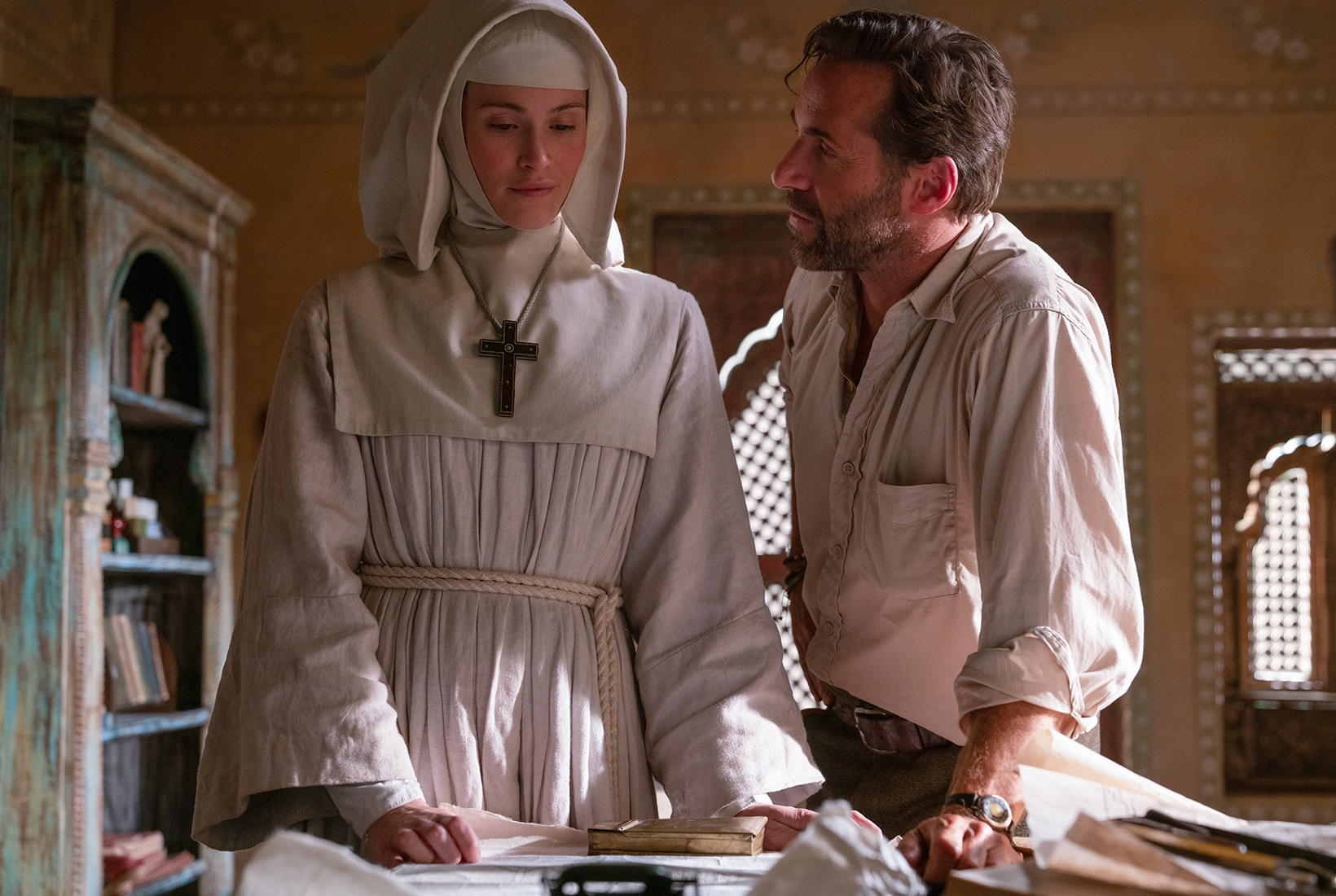In Black Narcissus, based on the novel by Rumer Godden, five nuns set off for a remote Himalayan palace in 1934 to set up a convent school. The palace, donated by an Anglophile general, used to be a harem and was still adorned with erotic paintings. It was also where the general’s sister, Srimati, had committed suicide and where, just a few months previously, a male religious order had tried to establish a school too, before retiring defeated for mysteriously undisclosed reasons. The nuns’ main helper in practical matters, a British expat called Mr Dean (Alessandro Nivola), possessed an overwhelming maleness that expressed itself through such attributes as a chiselled jaw, an Indiana Jones hat and a handy way with a spanner. So what could possibly go wrong? The answer, naturally, was quite a lot — although much of it very very slowly.
The nuns’ leader Sister Clodagh (Gemma Arterton) was initially characterised by a rather priggish commitment to perfection that extended to questions of grammar. ‘It is I,’ she told Mr Dean when he came looking for the new Sister Superior. ‘None of us is different,’ she explained to a fellow nun struggling to cope with the surroundings. Before long, though, Clodagh began to recognise that neither her more undesirable desires nor the reality of her new world could be covered up as easily as those erotic paintings. Instead, the sight of Mr Dean wielding his spanner brought on some sexy images of her own as she remembered a pre-convent relationship. Officially, needless to say, she disapproved of Mr D.’s uncouthness — what with his fondness for whisky and local lovelies. On the other hand, he did look good in that hat…
Mr D.’s maleness expressed itself through a chiselled jaw, an Indiana Jones hat and a handy way with a spanner
Meanwhile, as the window shutters banged away to unmistakably sinister effect, the palace was having a spooky effect on the other nuns too: especially Sister Ruth (Aisling Franciosi), who started to have visions of Srimati and to bear a growing resemblance to Linda Blair in the early scenes of The Exorcist. Not only that, but Ruth had also spotted Mr Dean’s rugged charms — along, more gallingly, with his and Clodagh’s obvious mutual attraction.
And for most of the time, that was essentially that, with the individual scenes not so much deepening what we already knew as simply repeating it. Far into the third and final episode, the window shutters were still banging, Ruth was still seeing Srimati wherever she turned, Clodagh was still sexually haunted by her lost love and she and Mr Dean were still squabbling away while clearly fancying each other. (Think characters in a romcom with very little com.) True, there was an undeniably — indeed melodramatically — big climax, but by then that seemed like too much, too late.
The celebrated 1947 film of Black Narcissus by Michael Powell and Emeric Pressburger took 100 minutes to tell the same story and make the same points about the limitations of idealism and the pesky persistence of lust. This version filled its three hours in a way that felt increasingly effortful for the makers and viewers alike. In the end, even a uniformly strong cast — which included Diana Rigg in her last screen role as Clodagh’s wise old Mother Superior — wasn’t enough to save a drama that proved so overlong.
Ghosts was rewarded for being one of the best new comedy series of recent years by being given a Christmas special — and triumphantly rose to the challenge by sticking to what it already does so well.
The show’s premise for those who don’t know (and, come to think of it, for those who do) is that Mike and Alison Cooper have inherited a mansion from a distant relative which, as it turns out, they share with the embodied spirits of the people who died there: from a caveman to a 1990s Tory MP who, having breathed his last during a sex scandal, is spending eternity with no trousers on. The result is packed with great jokes both smart and silly, but also has an undertow of melancholy, based largely on the idea that it’s really frustrating being dead.
In this episode, the living characters followed the traditional sitcom Christmas-special pattern of hoping for the perfect Christmas, then not getting it and then realising that the messy, imperfect thing they got instead was even better. But, more surprisingly, there was just as much warmth in the tale of the trouserless MP coming to understand how badly he’d blown it when alive by neglecting his family for more fleshly pleasures. But, of course, this was not without melancholy either. After all, as Samuel Beckett suggested, the tragedy of life is the certainty that you’d do better next time coupled with the certainty that there is no next time. And on that note, happy Christmas everybody.







Comments